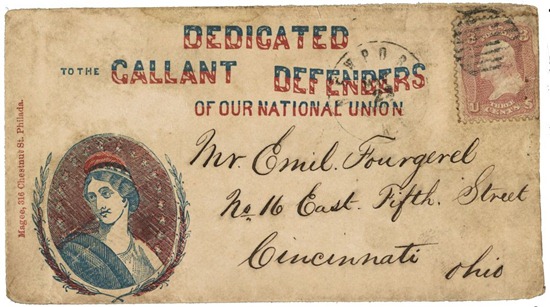Abby Howland Woolsey to her sisters Georgeanna Woolsey and Eliza Howland.
May.
My Dear Children : . . . Doesn’t Charley want something? Mother is racking her brain to think what it can be, as he no doubt does want something, going off in the hurry he did. She is afraid, too, that he is exposed to illness— running risks from the climate, from contact with soldiers’ clothing, from the atmosphere of the hospital ship, etc., etc.
Yesterday, Jane, Carry, Mrs. Buck, and Col. Bliss and a few others, started from Park Barracks for Bedloe’s Island on a committee of investigation. They chartered a little steam tug at ten dollars an hour, and went from the Battery, not staying very long, and quite enjoying the trip. They found the hospitals extremely comfortable. Some sick in the brick barracks, and some in three large hospital tents— close on the shore, with the sea breeze driving through them, and the waves rippling up close by. The men they saw were as pleased with their accommodations as could be, and everything looked ten times better ventilated and more hopeful than at the City Hospital, for instance. They have about a hundred men on Bedloe’s Island— mostly from the Ocean Queen— and not many now are alarmingly ill. The ladies took down four large baskets of oranges, jelly, towels, etc. —some of the abundant supplies that have been pouring in at the Park Barracks— and we are to get together next week some books for a library. Jane says she has seen what does her heart good at the City Hospital— some tidy, sensible, once-upon-a-time-fashionable ladies, nursing men every day in the fever wards — Mrs. Charles Strong, Miss Irving, and four or five others ; they went down and offered their services, which were accepted — such was the great number of sick, and the necessity of an immediate increase of nurses ; and they go down every morning at seven and go away at seven, taking their meals down there. Hired nurses, men, watch at night. Here was an excellent chance to put some of the port wine uncle E. sent us, into use. Jane came right up for a jug and put it in Mrs. Strong’s charge, and it has been of inestimable use already to some of the patients. These ladies must have served a week or ten days now, and will continue daily. They do everything for the men, under the direction of the doctors, administering food and medicine. It is really most praiseworthy and delightful, and, as in the case of your young doctors whom you like so much, gives you a better idea of human nature — their human nature, at all events. I cannot say so much for the young doctors of the New York Hospital as you do for yours. They made a strike the other day for increase of salary, writing the Trustees quite an impudent letter, reminding them what advantages the State now offered to volunteer surgeons at Yorktown, etc., and requesting an immediate answer. They did have a very immediate one. The gentlemen assembled next morning and sent the young doctors word that they could have just so many hours to pack up and quit,— an answer that astonished and mortified them. You see it was very mean, for it was just when the largest number of sick that the house could contain were being brought in. The Trustees intended to increase the corps of surgeons, but that these residents would not listen to, “they were fully competent to do all.” Jane went down this morning with Mrs. Professor Hitchcock, Mrs. Smith, and Mrs. Buck, to take their turn at 194, but found that the last week’s committee and their friends to the number of twenty, were so firmly established still, that they refused all hints about “relinquishing the keys,” being “tired of the service,” etc., etc. ; “Oh, no ; we are as fresh and interested as possible:” and indeed they were, though they were at the rooms until one last night, when Colonel Howe chartered an omnibus and sent them home. They had received all those who came yesterday afternoon by cars from Baltimore, and had worked faithfully, and hated to give up to the new set.





